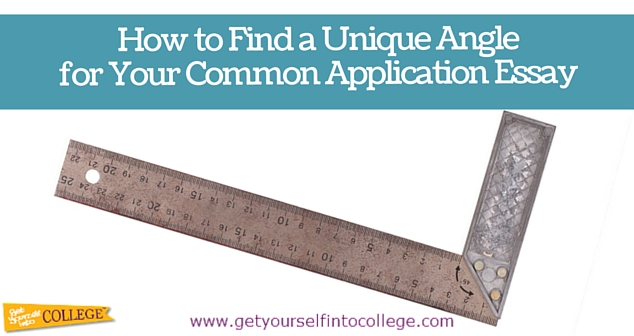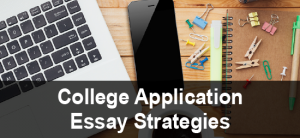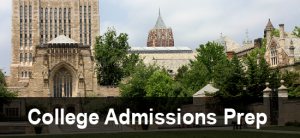The advice I’m about to give on how to find a unique angle for your Common Application essay probably goes against one of the primary rules you’ve learned about writing papers.
DON’T START BY FOCUSING
TOO MUCH ON THE
ESSAY TOPICS THEMSELVES
You should have a general sense of the essay prompts, but you don’t want to be restricted by them.
Why?
Here are three good reasons.
#1 You have creative license in your Common Application essay. The topics are designed to “inspire and structure,” not limit and determine your response.
That means you don’t have to stick to the topic the way you usually do when writing essays for school.
Take advantage of your freedom.
CLICK HERE to get more of my tips on the instructions related to the Common Application essay.
#2 Approaching essay topics head-on increases the chances that you’ll come up with the same basic ideas as thousands of other students.
The Common App wants to “make sure that every applicant can find a home within the essay prompts,” which means they develop a series of topics that connect with most students’ experiences.
You don’t have to write about a subject that no one else is writing about, but you do need to find an angle that will allow you to distinguish yourself.
#3 The first essay topic about your “background, identity, interest, or talent” basically allows you to write about anything you want. One of the new topics for the 2017-2018 admissions cycle is basically the same as the first prompt except you’re told to “share an essay on any topic of your choice. It can be one you’ve already written, one that responds to a different prompt, or one of your own design.”
**During the 2015-2016 admissions season, 47 percent of students selected this prompt. Just FYI, 22 percent wrote “about an accomplishment, 17 percent about a lesson or failure, 10 percent about a problem solved, and four percent about an idea challenged.”**
HOW TO FIND A UNIQUE ANGLE FOR
YOUR COMMON APPLICATION ESSAY
Now let’s explore the option of looking elsewhere for inspiration in coming up with an angle.
A few weeks ago, I was reading the essay that one of my students was about to submit to the National Council of Teachers of English (NCTE) Achievement Awards in Writing. Students are required to submit an example of what they consider their best work as well as a piece of themed writing.
I love the theme for 2016:
“We often experience conflicts between nurturing our passions and meeting our obligations—between what we want to do and what we must do. A passion brings deep personal satisfaction: we can help others, learn a topic deeply, make choices based on our interests, even find fulfillment and enjoyment. Our obligations are often more practical: we must meet deadlines, honor commitments, even sacrifice our passions for these responsibilities.
In a prose piece, using a personal or imaginative perspective, examine this conflict. You may wish to consider these questions as you begin: Can passions and obligations be held in balance? Are we always forced to make a choice? Can your passions and our obligations mesh?”
Why might this theme be a good starting point for your college application essay?
Admissions officers are very interested in learning more about your passions and how you’re pursuing them. However, just writing about what fascinates you is too broad of a topic for an essay that can be a maximum of 650 words.
You’ve got to find just the scope so that you can take admissions officers deep into your experience. If your scope is too broad, your essay will be superficial and ineffective. The NCTE prompt can help you narrow things down so that you’re focusing on a tension related to one of your passions.
Great college application essays usually feature a conflict or turning point in your life, which is another reason why this topic is a good springboard.
Why are conflicts so compelling to admissions officers?
Colleges are interested in your process of thinking through situations, grappling with challenges, and exploring options.
Don’t jump over the process.
Sometimes the process you describe is even more fascinating to readers than your specific passion, background, or failure.
HOW TO USE THE NCTE THEME
AS A SPRINGBOARD
FOR FIGURING OUT AN ANGLE FOR
YOUR COMMON APPLICATION ESSAY
Here are three questions to get you started:
- Has something gotten in the way of your ability to pursue one of your passions? How have you overcome that obstacle?
- Have you ever felt pressured to sacrifice one of your core interests or something else that’s very important to you? How did you handle the situation? What did you learn from it?
- Was there a time when you struggled to strike a balance between your “passions and obligations”?
An application essay related to one of these questions could work in relation to any one of the Common App essay topics (scroll down for more specifics). CLICK HERE to get my detailed guide to the 2017-2018 Common Application essay prompts.
I’m not the kind of college admissions consultant who declares that certain topics are off limits in application essays, but in general, I recommend avoiding writing about parents getting in the way of pursuing your passions. There are, of course, exceptions.
EXAMPLE OF A CONFLICT
RELATED TO YOUR PASSION
Imagine that you’re really passionate about making a positive difference in the lives of veterans suffering from post-traumatic stress disorder, but at first you couldn’t find a way to help.
A few things are for sure.
Admissions officers are going to want to know how you got interested in PTSD in the first place, the nature of your obstacle, and how you figured out a way to overcome it.
Maybe the obstacle is that as a high school student the only official opportunity for you to help was to serve as a greeter at your local VA medical center. Are you going to complain about offering service? No. You could, however, share an anecdote about how you discovered the value of doing something as simple as greeting veterans as they entered the clinic.
Let’s say that this experience sparked your interest in learning more about veterans’ experiences, so you started researching other ways you could serve them and discovered the Veterans History Project of the American Folklife Center and began conducting interviews with them. You could include a paragraph on your interviewing experience. In this kind of paragraph, you’d be revealing your ability to take the initiative and your process of resolving the conflict related to your passion.
Perhaps you started talking with the neurologists and psychiatrists at the medical center and began reading books like Jonathan Shay’s Achilles in Vietnam: Combat Trauma and the Undoing of Character. You could definitely include an account of your conversations with the doctors and what you discovered through your independent reading. In this paragraph, you’d be showing how you reach out to experts in the field and start conducting more traditional academic research on PTSD treatment for veterans.
At the end of your essay or within the body paragraphs themselves, you could reflect on what you’ve learned through this process of pursuing your passion and overcoming the obstacles in your way.
An essay that focuses on a conflict like this one would be so fascinating to admissions officers because you’d be sharing a series of vivid scenes that take them deep inside your experiences. They’d get to see you offering community service, contributing to a national history project, taking the initiative to seek out the advice of experts, and engaging in self-directed learning.
Obviously, this essay isn’t about a conflict related to nurturing your passion and meeting your obligations. It’s about a conflict between what you want to do and the resources available for pursuing your interest. You couldn’t use this for the NCTE essay, but you could use it for your Common App essay.
HOW TO FIGURE OUT WHICH
COMMON APPLICATION ESSAY TOPIC
BEST SUITS YOUR ANGLE
It’s probably obvious how this essay would work for the first topic about your “background, identity, interest, or talent” and the “problem you’ve solved or a problem you’d like to solve” topic.
But this essay could work for any of the topics.
Think creatively!
You could tinker with some of your wording to make it work for the “failure” essay. Perhaps at first you failed to recognize the possibilities. You were too narrow in your thinking.
Maybe someone told you that there was just no way for a high school student to really serve veterans with PTSD and you questioned or challenged that belief or idea.
Perhaps this whole experience transformed you from a child who waits for other people to structure your learning and create opportunities to someone who takes charge of their lives. This angle would allow you to respond to the Common Application essay topic that asks you to “Discuss an accomplishment, event, or realization that sparked a period of personal growth and a new understanding of yourself or others.“
Clearly, it’s essential to be authentic in your Common Application essays, but I hope this post has helped expand your sense of the approaches you can take in your Common App essay.
NEXT STEP
Want personalized support from me? Click here to register for a consultation with me. Click here to learn about other ways of working with me.
Blog post image used: ©Micha Klootwijk/bigstock.com



